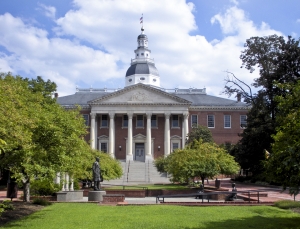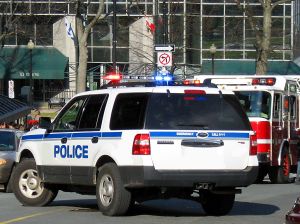Although not an official public holiday in America as it is in Ireland, each year on St. Patrick’s Day millions of Americans flock to the bars and pubs to join in the festivities. It is one of our country’s favorite holidays, where it’s not just acceptable, but encouraged to dress up in green and drink beer of the same color. Everyone is Irish on March 17th. But St. Patrick’s Day is also a busy day for law enforcement, and even busier when the holiday happens to fall on a weekend as it has for the past two years. This year, dozens of Maryland law enforcement agencies are ramping up their DUI patrols to combat the yearly spike in alcohol related car accidents on this festive day. Starting at 9 p.m. tonight, and lasting through Monday morning, the state police as well as local cops will be out in full force to zero in on anyone who attempts to get behind the wheel after one too many Guinness pints. The patrols will focus on areas that have a past history of larger volumes of injury accidents and other incidents involving alcohol. DUI patrols will not exclusively patrol these areas though, and are sure to be out in greater numbers on all heavily traveled roads.
Continue reading →
Maryland One Step Closer To Medical Marijuana
 Supporters in the fight to bring legal medical marijuana to Maryland received some uplifting news a few days ago from the governor’s office. While O’Malley did not actually come out and personally support legal use of the drug, he did give the go ahead for his health secretary to back the bill. During a hearing in Annapolis last Friday, secretary Sharfstein told lawmakers that the governor’s administration would now support medical marijuana legislation. The governor’s office did not address pending legislation for decriminalization and legalization of recreational marijuana use, but the health secretary’s statements did signal a reversal from the administration’s position on medical use this time last year.
Supporters in the fight to bring legal medical marijuana to Maryland received some uplifting news a few days ago from the governor’s office. While O’Malley did not actually come out and personally support legal use of the drug, he did give the go ahead for his health secretary to back the bill. During a hearing in Annapolis last Friday, secretary Sharfstein told lawmakers that the governor’s administration would now support medical marijuana legislation. The governor’s office did not address pending legislation for decriminalization and legalization of recreational marijuana use, but the health secretary’s statements did signal a reversal from the administration’s position on medical use this time last year.
In 2012 the medical use bills were defeated in the General Assembly due to concerns about state employees facing possible federal prosecution for developing and implementing a plan to dispense a drug that was, and is still is illegal under federal law. The actual likelihood of state employees being prosecuted by the feds was slim to none, and still remains a far-fetched scenario. Nonetheless, the governor’s office used this as an excuse to make sure the bill died, while at the same time assuring that medical use activists would be only the slightest bit offended. In essence this clever political play bought the governor an additional year to weigh the effects of serving as the executive of a state with legalized pot against his national political aspirations. After witnessing the groundbreaking popular votes in Colorado and Washington State, along with the continuing trend toward universal support of medical marijuana, it was an easy reversal for the governor.
Continue reading →
Supreme Court Hears Argument On Maryland DNA Case
 A few months back, the blog posted an article on a controversial Maryland law that allows police to sample and store DNA from any individual arrested for a violent crime or for burglary. Despite this law still being up on appeal, for the past few months state law enforcement agencies have continued to engage in this practice under the authority of a signed order from Chief Justice Roberts. The order did not overturn a decision by the state court of appeals, which declared the DNA law unconstitutional, but rather allowed DNA sampling to continue pending a final opinion by the country’s highest court. A decision on this controversial law is now expected in the coming months, as the Supreme Court recently heard arguments on the constitutionality police DNA sampling. The arguments were spirited to say the least, and at this early juncture there is no indication which way the majority appears to be leaning. But all justices are aware that this is could be a seminal opinion that could shape criminal procedure for the coming years. Justice Alito described it as the most important criminal procedure case in decades. He added that many murders and rapes could be solved using this technology, which involves a minimal intrusion on personal privacy, and asked why DNA sampling is not the fingerprinting of the 21st century. Whether these statements have tipped Alito’s hand remains to be seen, but there were is certainly some skepticism from the other justices about the law’s constitutionality.
A few months back, the blog posted an article on a controversial Maryland law that allows police to sample and store DNA from any individual arrested for a violent crime or for burglary. Despite this law still being up on appeal, for the past few months state law enforcement agencies have continued to engage in this practice under the authority of a signed order from Chief Justice Roberts. The order did not overturn a decision by the state court of appeals, which declared the DNA law unconstitutional, but rather allowed DNA sampling to continue pending a final opinion by the country’s highest court. A decision on this controversial law is now expected in the coming months, as the Supreme Court recently heard arguments on the constitutionality police DNA sampling. The arguments were spirited to say the least, and at this early juncture there is no indication which way the majority appears to be leaning. But all justices are aware that this is could be a seminal opinion that could shape criminal procedure for the coming years. Justice Alito described it as the most important criminal procedure case in decades. He added that many murders and rapes could be solved using this technology, which involves a minimal intrusion on personal privacy, and asked why DNA sampling is not the fingerprinting of the 21st century. Whether these statements have tipped Alito’s hand remains to be seen, but there were is certainly some skepticism from the other justices about the law’s constitutionality.
Continue reading →
The Arguments Against Legalization
 Those who have read most of our posts understand the blog’s position on the state marijuana laws. The medical use laws in Maryland do little to protect those who have an actual need for the drug because the users are not protected from being arrested or cited. On top of this, the statutory affirmative defense is always at the mercy of the presiding judge’s discretion, and there are simply too few judges that actually understand the medical benefits of marijuana. Call it ignorance or a generational gap, but whatever the reason the affirmative defense is rarely granted and offers little practical protection.
Those who have read most of our posts understand the blog’s position on the state marijuana laws. The medical use laws in Maryland do little to protect those who have an actual need for the drug because the users are not protected from being arrested or cited. On top of this, the statutory affirmative defense is always at the mercy of the presiding judge’s discretion, and there are simply too few judges that actually understand the medical benefits of marijuana. Call it ignorance or a generational gap, but whatever the reason the affirmative defense is rarely granted and offers little practical protection.
Decriminalization for simple possession would be a step in the right direction, but would only be a temporary fix that would fail to establish a firm stance on the drug’s place in society. Complete legalization for personal use, along with a structure for taxing and regulating the sale and use of marijuana would raise revenue for the state. At the same time, legalization would ease the burden on law enforcement and the judicial system. But it appears that legalization in Maryland is a long shot, and the latest House proposed bill is unlikely to make it out of committee. The state senate has yet to even propose a legalization bill. So what is the holdup? Why won’t any of these bills come across the governor’s desk, and if they do, why won’t he sign them? The balance of this post will outline the main arguments that seem to be standing in the way of progressive pot legislation.
Continue reading →
Marijuana Legalization Bill Introduced In Annapolis
 Marijuana legalization debates continue to ramp up on the floor of the state legislature, and the latest bill to be introduced is by far the most progressive to date. We previously posted an article about the introduction of Maryland Senate Bill 297, which dealt with the decriminalization of the popular drug. The most recent bill though takes Senator Zirkin’s proposal one step further, and calls for outright legalization of marijuana for recreational use. The new bill is nearly identical to the laws that were recently passed in Colorado and Washington. If passed into law, it would allow citizens over the age of 21 to possess one ounce or less of marijuana, and additionally to grow up to three plants in their homes. The current state law makes it illegal for anyone to possess even a residue amount of the plant, and violators face up to 90 days in jail for having 10 grams or less, and up to a year for possessing more than 10 grams.
Marijuana legalization debates continue to ramp up on the floor of the state legislature, and the latest bill to be introduced is by far the most progressive to date. We previously posted an article about the introduction of Maryland Senate Bill 297, which dealt with the decriminalization of the popular drug. The most recent bill though takes Senator Zirkin’s proposal one step further, and calls for outright legalization of marijuana for recreational use. The new bill is nearly identical to the laws that were recently passed in Colorado and Washington. If passed into law, it would allow citizens over the age of 21 to possess one ounce or less of marijuana, and additionally to grow up to three plants in their homes. The current state law makes it illegal for anyone to possess even a residue amount of the plant, and violators face up to 90 days in jail for having 10 grams or less, and up to a year for possessing more than 10 grams.
Continue reading →
Man Sentenced To Jail For 8th DUI
 Back in June the Blog posted an article about a man who was arrested for his 8th DUI, and now a sentence has finally been handed down in this unprecedented case. The defendant had three open Wicomico County drunk driving cases this year alone. Two of those cases were disposed of by way of guilty pleas back in October of this year. The man received a two-year jail sentence for the first case on the 19th of October, and he received three years for a separate case just one week later. Last week in Salisbury, a Circuit Court judge handed down the final sentence of an additional three years, bringing the total amount of jail time to eight years, one for each conviction. The most recent case was certainly the most egregious of the three, as the intoxicated man apparently slammed straight into a stopped car at a red light intersection. To make matters worse, the defendant was also driving without his required engine interlock device, which does not allow the car to be started without an alcohol free breath sample
Back in June the Blog posted an article about a man who was arrested for his 8th DUI, and now a sentence has finally been handed down in this unprecedented case. The defendant had three open Wicomico County drunk driving cases this year alone. Two of those cases were disposed of by way of guilty pleas back in October of this year. The man received a two-year jail sentence for the first case on the 19th of October, and he received three years for a separate case just one week later. Last week in Salisbury, a Circuit Court judge handed down the final sentence of an additional three years, bringing the total amount of jail time to eight years, one for each conviction. The most recent case was certainly the most egregious of the three, as the intoxicated man apparently slammed straight into a stopped car at a red light intersection. To make matters worse, the defendant was also driving without his required engine interlock device, which does not allow the car to be started without an alcohol free breath sample
The jail sentences were ordered to be served consecutively, meaning that the man will have to finish serving time on each individual case before he can receive credit for time served in the others. The judge could have imposed the three-year sentence to run concurrently, but then the defendant would not have to serve any additional time. After completing the eight years, which includes four with the Department of Corrections, the man will have one year of probation with an extra year hanging over his head in case of a violation.
Continue reading →
Marijuana Decriminalization Bill To Hit The Floor
 We discussed in the last blog entry that state lawmakers were planning to introduce new legislation on medical and synthetic marijuana. These bills are still in the works, but the big news coming out of the state house is that a brand new marijuana decriminalization bill is scheduled for a debate today in Annapolis. Maryland Senate Bill 297, proposed by state senator Zirkin, would effectively reduce the punishment for simple possession of marijuana from a maximum 90 days in jail to a maximum $100 fine. In addition simple possession, which is defined as less than 10 grams of the drug, would no longer be part of the state criminal code. Much like a parking ticket, violators of the proposed law would only be subject to a civil fine and would not be at risk of jail time or a criminal conviction. The hearing was scheduled for debate this afternoon, and promises to feature spirited testimony from a variety of politicians, former law enforcement officers, and even economists.
We discussed in the last blog entry that state lawmakers were planning to introduce new legislation on medical and synthetic marijuana. These bills are still in the works, but the big news coming out of the state house is that a brand new marijuana decriminalization bill is scheduled for a debate today in Annapolis. Maryland Senate Bill 297, proposed by state senator Zirkin, would effectively reduce the punishment for simple possession of marijuana from a maximum 90 days in jail to a maximum $100 fine. In addition simple possession, which is defined as less than 10 grams of the drug, would no longer be part of the state criminal code. Much like a parking ticket, violators of the proposed law would only be subject to a civil fine and would not be at risk of jail time or a criminal conviction. The hearing was scheduled for debate this afternoon, and promises to feature spirited testimony from a variety of politicians, former law enforcement officers, and even economists.
Continue reading →
Marijuana On The Minds Of State Lawmakers
 As we approach the midway point in this year’s legislative session in Annapolis, it should come as no surprise that marijuana is trending heavily on the floor. Representative Glenn of Baltimore planned to introduce the Maryland Medical Marijuana Act to the House Judiciary Committee. This is the same bill that lost steam during the legislative gauntlet last winter. The bill would allow the state’s Department of Health and Mental Hygiene to establish centers for marijuana distribution for patients with a medical necessity for the drug, provided they are under the continuous care of a doctor. Ms. Glenn is quoted as saying that “people are suffering everyday in the state of Maryland, and they are being subjected to going out on the streets for the relief we should be providing.” In addition to suffering unnecessary pain and anguish, medical marijuana users also face arrest and prosecution from State’s Attorneys and Judges who naively believe marijuana is a dangerous drug with no legitimate benefits. This type of archaic thinking is especially present in the more rural areas of the state, and in stricter jurisdictions such as Harford County and Worchester County.
As we approach the midway point in this year’s legislative session in Annapolis, it should come as no surprise that marijuana is trending heavily on the floor. Representative Glenn of Baltimore planned to introduce the Maryland Medical Marijuana Act to the House Judiciary Committee. This is the same bill that lost steam during the legislative gauntlet last winter. The bill would allow the state’s Department of Health and Mental Hygiene to establish centers for marijuana distribution for patients with a medical necessity for the drug, provided they are under the continuous care of a doctor. Ms. Glenn is quoted as saying that “people are suffering everyday in the state of Maryland, and they are being subjected to going out on the streets for the relief we should be providing.” In addition to suffering unnecessary pain and anguish, medical marijuana users also face arrest and prosecution from State’s Attorneys and Judges who naively believe marijuana is a dangerous drug with no legitimate benefits. This type of archaic thinking is especially present in the more rural areas of the state, and in stricter jurisdictions such as Harford County and Worchester County.
Continue reading →
Expect Increased DUI Patrols On Super Bowl Sunday
 Police departments around the country are planning to ramp up their DUI detection and suppression efforts for the big game this weekend. Cops will deploy more road patrol officers than normal, and set up numerous checkpoints around the country this coming Sunday. These patrols and checkpoints will focus on popular nightlife areas and suburban neighborhoods where millions will be hosting or attending parties. Baltimore will likely see a large police presence in the downtown area, as thousands of Ravens fans will be out watching and celebrating the hometown team. The best piece of advice for any party goer who plans on drinking is to walk, take public transportation, or cab it. But, as most Marylanders are aware the state’s public transportation system and taxi cab network is hardly to most accessible, so driving is usually the only option. Get a designated driver, and try to find one that’ll be able to resist the temptation to drink when the Ravens are playing well, playing poorly, or doing both from one play to the next.
Police departments around the country are planning to ramp up their DUI detection and suppression efforts for the big game this weekend. Cops will deploy more road patrol officers than normal, and set up numerous checkpoints around the country this coming Sunday. These patrols and checkpoints will focus on popular nightlife areas and suburban neighborhoods where millions will be hosting or attending parties. Baltimore will likely see a large police presence in the downtown area, as thousands of Ravens fans will be out watching and celebrating the hometown team. The best piece of advice for any party goer who plans on drinking is to walk, take public transportation, or cab it. But, as most Marylanders are aware the state’s public transportation system and taxi cab network is hardly to most accessible, so driving is usually the only option. Get a designated driver, and try to find one that’ll be able to resist the temptation to drink when the Ravens are playing well, playing poorly, or doing both from one play to the next.
Police departments tend to send out press releases about increased DUI patrols because their publicly stated goal is to prevent drunk driving. But for the road patrol officers out on the street who aren’t able to watch the game, their goal is to make arrests. Many false or illegal DUI arrests occur on holidays or during large events when cops are on high alert. You can be sure that police will be quick to arrest after a traffic stop or at a checkpoint throughout the day and night on Sunday at the first hint of alcohol. Simply having a few drinks and then driving is not illegal. For police to make and arrest, a driver must either have a blood alcohol level of at least .08 or display to the stopping officer that they are intoxicated or under the influence to the extent that their faculties are impaired. It is not illegal to smell like beer and get behind the wheel, so it is important to know your rights if you happen to be pulled over.
Continue reading →
Legal Marijuana Unlikely in 2013
 This year’s legislative session is well under way in Annapolis, and all signs point to the conclusion that legalized pot is still a pipedream in Maryland. The state made national and even global headlines in November for officially sanctioning same sex marriage and has been called one of the most liberal in the country. But when it comes to drug enforcement, and marijuana in particular, Maryland is a far cry from liberal. In fact, our great state is stricter than most when it comes to drug crimes and possible sentences. Possession of over ten grams of the drug still carries a one year jail sentence, and cops around the state are arresting large numbers of simple possession defendants. There are multiple reasons for the grim outlook on possible recreational and medical marijuana legalization, but the biggest reason comes from the top of the political food chain. Governor O’Malley has repeatedly threatened to veto any legalization bill that crosses his desk, and has shown no signs of backing down from this stance.
This year’s legislative session is well under way in Annapolis, and all signs point to the conclusion that legalized pot is still a pipedream in Maryland. The state made national and even global headlines in November for officially sanctioning same sex marriage and has been called one of the most liberal in the country. But when it comes to drug enforcement, and marijuana in particular, Maryland is a far cry from liberal. In fact, our great state is stricter than most when it comes to drug crimes and possible sentences. Possession of over ten grams of the drug still carries a one year jail sentence, and cops around the state are arresting large numbers of simple possession defendants. There are multiple reasons for the grim outlook on possible recreational and medical marijuana legalization, but the biggest reason comes from the top of the political food chain. Governor O’Malley has repeatedly threatened to veto any legalization bill that crosses his desk, and has shown no signs of backing down from this stance.
Other concerns stem from concern amongst legislators that the federal government would step in and begin prosecuting any legal state marijuana operations. The drug is still years away from federal legalization and the Justice Department has shown no signs of change on the issue either. But according to supporters for legalization, concerns over the federal government meddling in the state’s medical marijuana policy is unfounded and lacks precedent. There are very few cases around the country where the federal government has made an effort to corral medical use operations, and there is no evidence that the federal government is going to interfere with Colorado and Washington’s recreational use laws. Lately, it seems the federal government excuse is becoming more popular with politicians across the country that are reluctant to take a stance on legalization.
Continue reading →
 Criminal Defense Lawyer Blog
Criminal Defense Lawyer Blog

